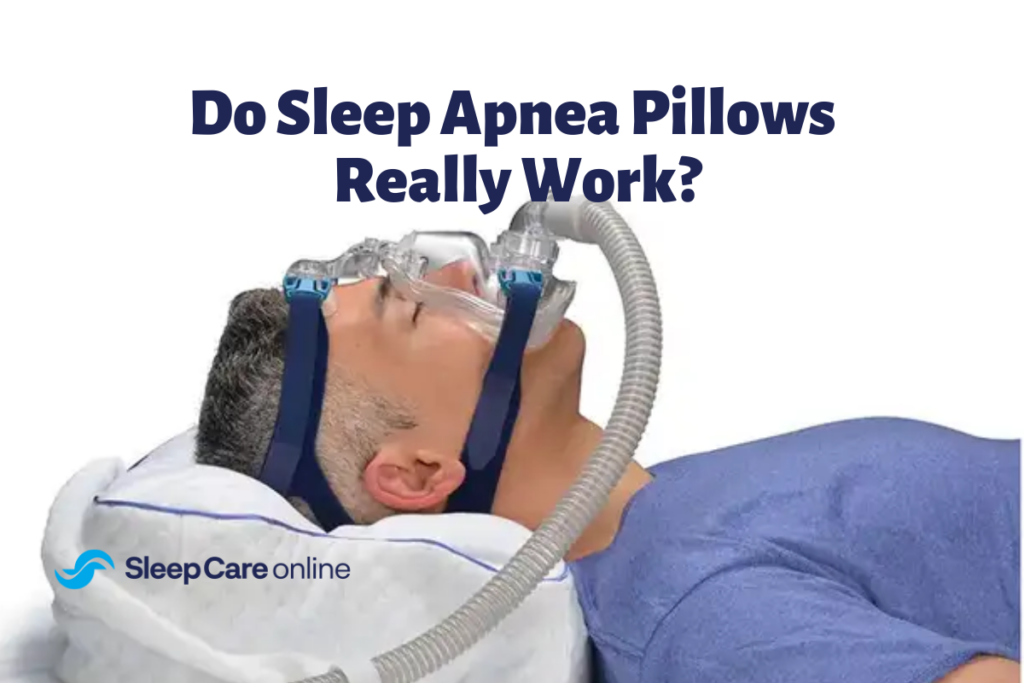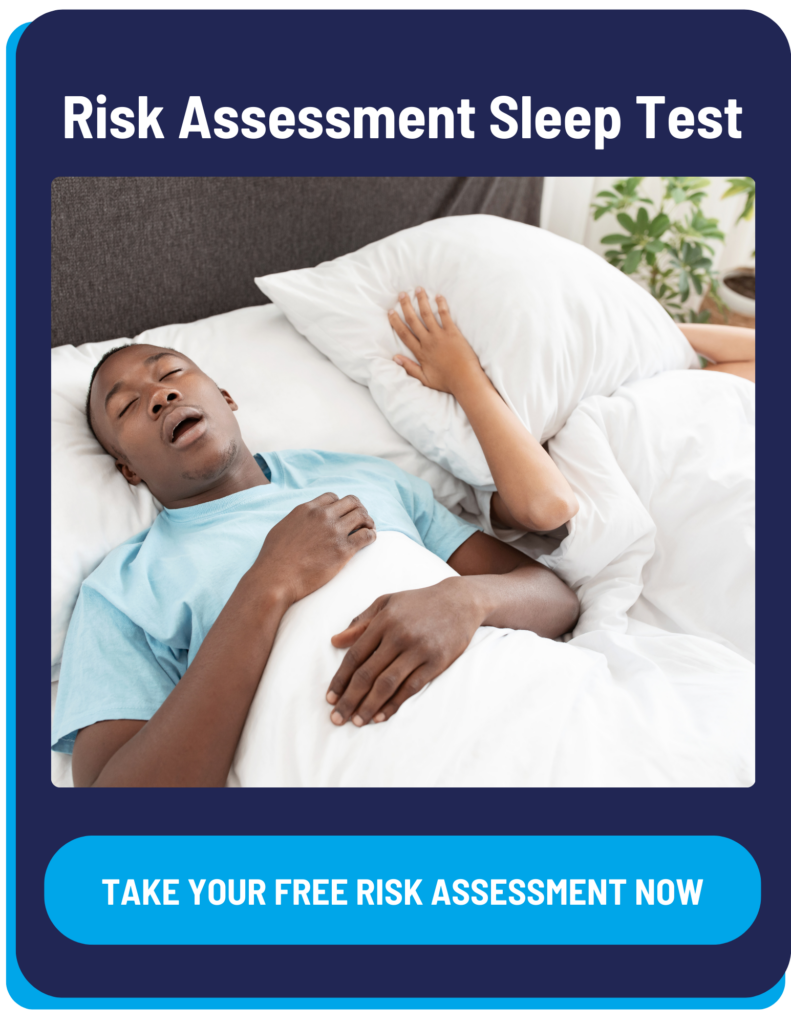Key Takeaways:
- The pillow you choose to sleep on each night can play a part in your sleep apnea symptoms, due to the way a pillow can align your body.
- While the proper pillow will not be able to treat sleep apnea alone, it can potentially lessen the amount of sleep apnea symptoms and apnea episodes you have at night.
- Positioning yourself properly and using the right pillow can make a big difference in your sleep health and overall well-being. Learn more about the proper pillow style and shape for sleep apnea in this article.
While sleep apnea requires treatment, most often CPAP therapy, a quality pillow may help alleviate or improve symptoms. There are several options to choose from, but the best sleep apnea pillow can help you achieve a good night’s sleep without frequent apnea events.

Pillows for Sleep Apnea
Obstructive sleep apnea can often be made worse depending on the patient’s sleeping position. Typically, this means that sleeping on your side or stomach will help reduce apnea events. If you are a back sleeper, wedge pillows may help elevate the head enough to reduce sleep apnea symptoms. Memory foam pillows are also popular choices, while some pillows are designed specifically for use with a CPAP mask. Knowing all your options will help you select the appropriate pillow for you.
Treating Sleep Apnea
After being diagnosed with sleep apnea by your physician, they will be able to go into more detail about the disorder and the severity of yours. Sleep apnea severity is determined by different Apnea Hypopnea Index (AHI) levels:
- Mild Sleep Apnea: AHI is between 5-15 apnea events per hour
- Moderate Sleep Apnea: AHI is between 15-30
- Severe Sleep Apnea: AHI is more than 30 apnea events per hour
To treat any level of sleep apnea, CPAP therapy is the most common and recommended among doctors. CPAP therapy uses a CPAP machine to deliver pressurized air into your airways to keep them open at night while you sleep. CPAP therapy not only improves your AHI, but will also alleviate and/or reduce any of the negative symptoms that come with the disorder, including snoring, daytime fatigue, headaches, and more.
Do Sleep Apnea Pillows Really Work?
For individuals already using CPAP therapy, CPAP pillows can help make therapy more comfortable. These pillows, like the ones sold by The CPAP Shop, are designed to accommodate a bulky CPAP mask and tubing. Other pillows, such as wedges and memory foam pillows, can greatly improve sleep and reduce apnea events in mild cases.
Sleep apnea pillows are not a cure for the disorder and should not be used in place of an official diagnosis. Be sure to speak with a physician about how you can benefit from a change in pillows.
Does My Pillow Help With Snoring?
One of the most common symptoms of sleep apnea is loud snoring. While snoring itself is not an indicator of the sleep condition, it can still be annoying for bed partners. A quality wedge pillow will often help alleviate snoring, as it elevates the head and can clear the airway.
What to Look For in a Sleep Apnea Pillow
While the proper pillow will not be able to treat sleep apnea alone, it can potentially lessen the amount of apnea you have at night. It can also make sleeping with your CPAP equipment more comfortable to improve your overall sleep quality. When selecting a pillow, consider the following:
The Pillow Material: This decision is based on what a user values most. Pillows vary in material including:
- Latex that are hypoallergenic, ideal for those who have allergies
- Memory foam, ideal for those who want their maintain the proper shape
- Wool and cotton, ensuring a stable body temperature at night
- Silk, promoting clean skin and is believed to reduce facial wrinkles
Your Sleeping Position: The way you choose to sleep can affect your sleep apnea. It is widely recommended to sleep on your side or back if you have sleep apnea, rather than your back. However, if you are used to sleeping on your back, making the change to a different position can be challenging. That’s why there are pillows specifically designed for this problem to make the transition easier.
- Side sleepers should use a contoured pillow to support their shoulders and neck.
- Stomach sleepers should use a pillow with not a lot of height so the head and neck aren’t too propped up.
- If you are a back sleeper and cannot break their habit, a wedge pillow may be best to elevate your neck while you are asleep.
The Pillow Height: The height, often referred to as the loft of your pillow, impacts the angle of both your head and neck which also impacts how you sleep and breathe at night. Low-lofted pillows are better for stomach sleepers, and back and side sleepers should have a pillow with a medium loft.
What is the Best Pillow for Sleep Apnea?
The best sleep apnea pillow should be comfortable and reduce air leaks from CPAP face masks. Several types of pillows are compatible with CPAP therapy. They are:
- CPAP Contoured Pillow
- Butterfly Shaped CPAP Pillow
- Cervical Pillow
- Cervical Contoured Pillow
- Memory Foam
- Wedge Pillow
- Feather Pillow
You can find the best sleep apnea pillow in The CPAP Shop with the best quality and discounts.
Sleep Apnea Mattress
A mattress is just as important to your sleep health as your pillow. While mattresses cannot cure sleep apnea, they can help alleviate symptoms and allow you to sleep more comfortably. Adjustable airbeds, memory foam, and hybrid mattresses are popular options when selecting a mattress for your sleep apnea.
How to Choose a Mattress for Sleep Apnea?
Adjustable sleep apnea mattresses come with many different features including firmness and temperature adjustments, as well as multiple settings for elevating the feet and head. Some may include massage functionality. Select the one sleep apnea mattress that offers the features you like best at an affordable price.
As mentioned above, mattresses and pillows may help alleviate some symptoms of sleep apnea, such as snoring. However, they are not a cure. Untreated sleep apnea can increase health risks, such as cardiovascular disease, hypertension, stroke, and more.
Get Diagnosed for Sleep Apnea
That’s why it’s important to get a sleep apnea test. Sleep Care Online offers at-home sleep apnea testing that’s easy to take in the comfort of your own bed. You receive expert consultation and access to treatment all without visiting a doctor’s office. Here’s how it works:
- With the Complete Care Package, schedule a 10-minute telehealth visit with a healthcare provider to discuss your symptoms, upcoming sleep study, test results, and treatment options.
- A multi-night, disposable home sleep apnea test is mailed to your home to be completed at your convenience.
- A physician analyzes the sleep data and provides a prescription if needed.
- Schedule an optional follow-up appointment (additional fee applies).
- We connect you to sleep experts who can offer customized sleep therapy options, assistance in equipment purchase, and initial set-up.
If you would to learn more, contact our knowledgeable customer care team at 866-465-4478 or contact@sleepcareonline.com.




